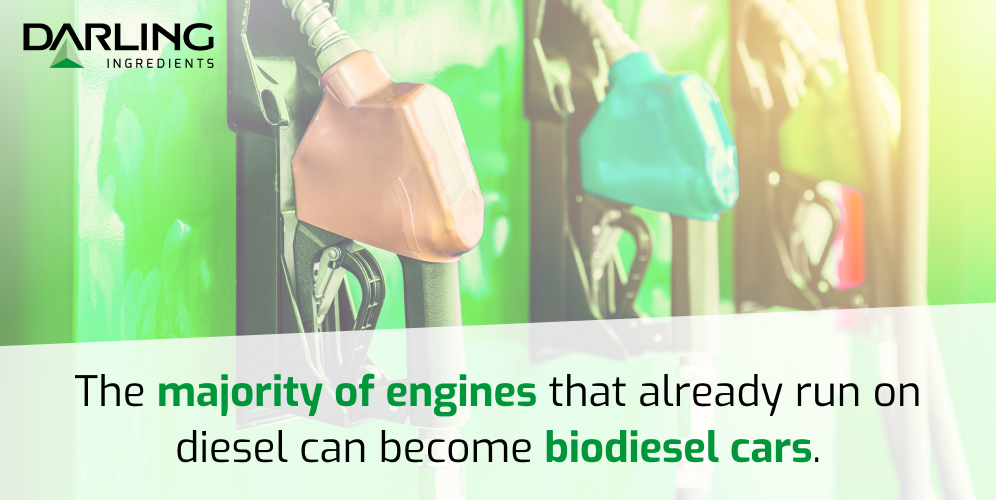Are biodiesel and renewable diesel the same thing?
A lot of people mistakenly use the terms biodiesel and renewable diesel interchangeably.
Renewable diesel is a high-quality fuel alternative that can be used up to 100% in vehicles and up to 50% in airplanes. Unlike biodiesel, renewable diesel is chemically identical to petroleum-based diesel. This feature allows it to be seamlessly integrated into the existing pipeline for distribution and used without any modifications to diesel engines.
Renewable diesel is not only capable of powering vehicles alone but also reduces carbon emissions by up to 80% per gallon.
Federal legislation for alternative fuels requires that petroleum diesel make up a minimum of one percent of any blend. This ruling is why we refer to renewable as R-99, meaning it is 99 percent renewable. The remaining one percent is petroleum.
What vehicles can run on biofuel?
Biofuel is crucial in cutting down carbon emissions. Let’s take a closer look at what kind of vehicles alternative fuels are powering.
Biodiesel vehicles
The majority of engines that already run on diesel can become biodiesel cars. As previously mentioned, biodiesel is an add-in fuel that comprises between five and 20 percent of a petroleum blend.
For example, if you see a power strand titled B-5, the fuel strand contains a five percent blend of biodiesel. B-20 is the maximum percentage typically seen.
Some vehicles that run on B-20 biodiesel include:
Chevrolet Colorado
Chevrolet Silverado
Ford Super Duty F250, 350, and 450
Ford Transit
GMC Sierra 250 or 3500 HD
GMC Terrain
Jaguar XE 20D
Ram 2400, 3500, 4500, and 5500
Range Rover Vela
Biodiesel also fuels local municipality vehicles. For example, the Chicago Park District vehicles run on biodiesel from used cooking oil. Its ability to blend with petroleum makes it a quick, safe, and clean way to curb carbon emissions while being compatible with passenger and commercial vehicles.

Renewable Diesel Vehicles
Renewable diesel works the same as biodiesel in that it can power any engine that runs on diesel. As previously mentioned, it is a drop-in replacement for petroleum and can power vehicles independently without needing to be blended.
Renewable diesel is compatible with existing diesel engine infrastructure and does not freeze at lower temperatures like biodiesel. For this reason, most heavy-duty trucking manufacturers approve of its use and have shifted towards powering their fleets with renewable diesel.
Because renewable diesel is a newer option, it is unfortunately not widely produced. Limited production amounts make it unavailable to power passenger vehicles.
The growing production of renewable diesel is making progress but needs time to expand its use and become more readily available. Despite this current limitation, renewable diesel is more effective in curbing emissions per gallon than biodiesel.
Canada remains energy-efficient and biofuel-producing
When the Canadian Net-Zero Emissions Accountability Act became law, it showed environmental commitment to clean energy by emitting and offsetting greenhouse gas emissions. The country’s Clean Fuel Standard forced renewable energy and carbon capture technology markets to skyrocket.
Last year alone, Canada consumed approximately 962 million liters of biodiesel and renewable diesel. The total increased by 892 million liters from 2020. Canada plans for an additional 81 million liters of production capacity this year to keep up with demands.
According to a report filed with the USDA Foreign Agricultural Service’s Global Agricultural Information Network, Canada expects to have 3.27 billion liters of renewable biofuel production capacity within the next four years.

Providing solutions to biofuel feedstocks
Canada currently operates twelve biodiesel plants with a combined 912 million liters capacity. However, most facilities operate at an estimated 50 percent capacity, producing 460 million liters of fuel created from canola oil.
Fossil fuels are already depleting, but the future fear is that there will not be enough feedstock from waste or crops to keep pace with the current renewable diesel projects. New facilities hoping to jump on the market will likely operate at low capacities or risk cancellation.
Even if a third of the new projects proceed, demand will skyrocket. If we create fuel solely from corn, feedstock must come directly from the food supply. This outcome would force domestic crops to expand, drive up costs of imports, or expand oil production in other parts of the world where deforestation already runs rampant.
Waste oils may be the current solution to preventing future problems. By recycling products we already use, we can mitigate the potentially adverse effects of expansion.
Why choose to partner with Darling Ingredients Canada?
Darling Ingredients Canada’s purpose is to repurpose. Our critical and environmentally safe solutions help protect food chains, keep people and animals safe, and benefit the environment.
With roots going back to the early beginnings of the biofuel market, we don’t fall alongside market crashes. With a legacy of professional experience, Darling Ingredients Canada has emerged as a global leader and innovator in developing and producing sustainable energy ingredients.
We source quality products and services for industries worldwide, converting waste oil into ingredients used in renewable diesel production. Reach out to a Darling representative today to discover how your business could benefit from our partnership.
Contact Sales
For customer service inquiries call our toll free number (800) 263-0302
By submitting this form I agree to the privacy policy including the usage of contact details to contact me for marketing purposes.
